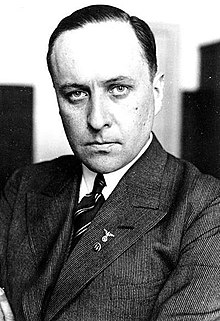R. Walther Darré
| Richard Walther Darré | |
|---|---|
 |
|
| Reichsminister of Food | |
|
In office 29 June 1933 – 23 May 1942 |
|
| Chancellor | Adolf Hitler |
| Preceded by | Alfred Hugenberg |
| Succeeded by | Herbert Backe |
| Personal details | |
| Born |
Ricardo Walther Oscar Darre 14 July 1895 Buenos Aires, Argentina |
| Died | 5 September 1953 (aged 58) Munich, West Germany |
| Nationality | German |
| Political party | Nazi Party |
| Alma mater | University of Halle |
| Profession | Agronomist |
| Cabinet | Hitler |
| Military service | |
| Rank | SS-Obergruppenführer |
Richard Walther Darré (born Ricardo Walther Oscar Darré; 14 July 1895 – 5 September 1953), was one of the leading Nazi "blood and soil" (German: Blut und Boden) ideologists and served as Reich Minister of Food and Agriculture from 1933 to 1942. He was a high-ranking functionary in the SS and the seventh most senior commander in the organisation.
Darré was born in Belgrano, a Buenos Aires neighbourhood, in Argentina to Richard Oscar Darré, a German with Huguenot ancestry, (born 10 March 1854, Berlin; died 20 February 1929, Wiesbaden) and the half-Swedish/half-German Emilia Berta Eleonore, née Lagergren (born 23 July 1872, Buenos Aires; died 20 July 1936, Bad Pyrmont). His father moved to Argentina in 1888 as a partner of the German international import/export wholesaler Engelbert Hardt & Co. Although his parents' marriage was not a happy one (Richard Walther remembered his father as a hard drinker and a womanizer), they lived prosperously, and educated their children privately until they were forced to return to Germany as a result of worsening international relations in the years preceding World War I. Darré gained fluency in four languages: Spanish, German, English, and French.
Darré's parents sent him to Germany at age nine to attend school in Heidelberg; in 1911 he attended as an exchange pupil King's College School in Wimbledon. The rest of the family returned to Germany in 1912. Richard (as he was known in the family) then spent two years at the Oberrealschule in Gummersbach, followed in early 1914 by the Kolonialschule for resettlement in the German colonies at Witzenhausen, south of Göttingen, which awakened his interest in farming.
...
Wikipedia
